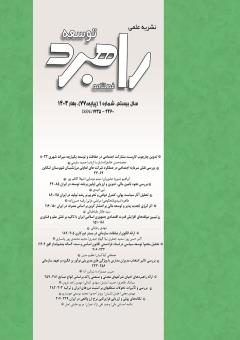اثر انرژی تجدید پذیر و توسعه مالی بر انتشار کربن بر اساس مصرف در ایران
محورهای موضوعی :
1 - عضو علمی دانشگاه پیام نور
کلید واژه: کلیدواژه: انتشار کربن بر اساس مصرف, رشد اقتصادی, توسعه مالی, مصرف انرژی تجدید پذیر,
چکیده مقاله :
پژوهش حاضر اثر توسعه مالی و مصرف انرژی تجدید پذیر بر انتشار کربن بر اساس مصرف در ایران را با کنترل متغیرهای رشد اقتصادی و مصرف الکتریسیته را در دوره 1990 الی 2021 بررسی کرده است. پس از بررسی آزمون مانایی متغیرهای پژوهش آزمونهای دیکی فولر تعدیلشده و زیوت-اندروز، آزمون هم جمعی بایر و هانک جهت بررسی وجود هم جمعی بین متغیرهای پژوهش انجامشده است. سپس از رگرسیون هم جمعی شامل تخمین زنندههای خود رگرسیونی با وقفه توزیعی، حداقل مربعات معمولی کامل تعدیلشده، حداقل مربعات معمولی پویا و آزمون تغییرات تدریجی علی برای بررسی رابطه بلندمدت متغیرهای و رابطه علی آنها استفادهشده است. نتایج بهوضوح نشان میدهد توسعه مالی و مصرف انرژی تجدید پذیر باعث کاهش انتشار کربن بر اساس مصرف در ایران شده و توسعه اقتصادی و توسعه مالی انتشار کربن بر اساس مصرف را افزایش میدهد. نتایج آزمون تغییرات علی تدریجی، تأییدکننده نتایج اصلی روشهای مورداستفاده تخمین بوده است. ازاینرو سیاستگذاران در ایران باید تحقیق و توسعه در فنآوریهای با مصرف کمکربن را تشویق نموده و همچنین سرمایهگذاریها در انرژیهای تجدید پذیر را هدف قرار داده و از سطح واردات انرژیهای تجدید ناپذیر را کاهش داده و از سرمایهگذاری در بخشهای با مصرف انرژی بالا که منجر به افزایش در انتشار کربن بر اساس مصرف شود اجتناب کنند.
The current research has investigated the effect of financial development and renewable energy consumption on carbon emissions based on consumption in Iran by controlling the variables of economic growth and electricity consumption in the period from 1990 to 2021. After examining the Manai test of the research variables using modified Dickey-Fuller and Ziot-Andrews tests, Bayer and Hank's cointegration test was performed to check the existence of collinearity between the research variables. Then, autoregressive distributed lag estimators, fully modified ordinary least squares, dynamic ordinary least squares and gradual shift causality test were used to investigate the long-term relationship of variables and their causal relationship. The results clearly show that financial development and renewable energy consumption reduce carbon emissions based on consumption in Iran, and economic development and financial development increase carbon emissions based on consumption. The results of the test of gradual causal changes have confirmed the main results of the estimation methods used. Therefore, policymakers in Iran should encourage research and development in low-carbon technologies and also target investments in renewable energy and reduce the level of non-renewable energy imports and avoid investing in high energy consumption sectors that lead to an increase Avoid carbon emissions based on consumption.
